The Challenge of Client Acquisition in Today’s Legal Landscape
As a legal professional, you’re likely no stranger to the challenges of standing out in a crowded and competitive market. The legal landscape has undergone a significant digital transformation, and with it, the way clients find and engage with lawyers has changed dramatically. Even if your law firm offers exceptional services, without a solid plan for lead generation for lawyers, potential clients may struggle to find you.
This is where professional lead generation companies like Rule Your Kingdom come in. When you employ attorney lead generation services from a reputable search engine optimization agency, your law firm’s website is transformed into a platform that generates quality leads and more prospective clients.
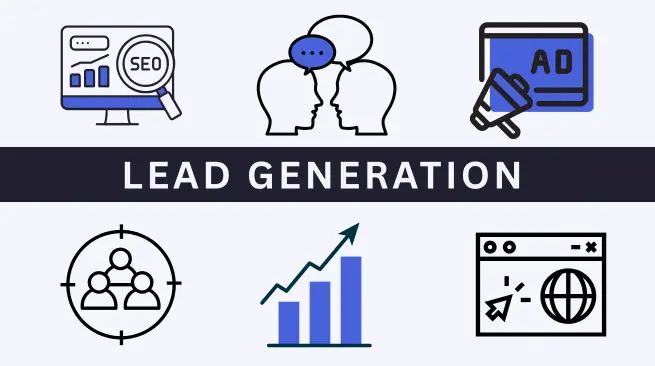
This comprehensive guide from legal marketing specialists provides proven strategies for attorney lead generation, specifically designed for the unique challenges faced by legal professionals in 2025.
Drawing on our expertise as attorney lead generation experts, we’ll walk you through the entire process of creating sustainable growth for your practice. You’ll discover how to leverage your law firm’s website, optimize your search engine rankings, and implement a multi-channel approach that consistently delivers attorney leads and returning clients.
Why Do Law Firms Fail to Generate Leads?
In our experience, our law firm clients often struggle to generate leads due to a few key reasons. Some common challenges include:

- A weak online presence
- Not creating valuable content
- Limited networking
- Ineffective advertising
- Not leveraging referrals
The consequences of ineffective lead generation can be stark and immediate. Empty consultation slots mean lost revenue, while firms that successfully adapt to digital marketing see their client base grow steadily. Unfortunately, many law firms invest heavily in advertising campaigns or lead generation services that fall short, resulting in wasted resources and unqualified leads.
Law firms today face an increasingly competitive arena where traditional methods of acquiring new clients are no longer sufficient. The legal industry has undergone a digital transformation, yet many attorneys struggle to adapt their marketing tactics to match this shift.
Your law firm might offer exceptional legal services, but without effective strategies to generate leads, potential clients and attorney leads simply won’t find you.
The consequences of poor lead generation are severe and immediate. Empty consultation slots translate directly to lost revenue, while competitors who master law firm online lead generation steadily grow their client base.
Many law firms waste thousands of dollars on ineffective advertising campaigns or low-quality lead generation services that deliver unqualified prospects.
Fortunately, we can take steps to avoid those pitfalls. Our attorney lead generation processes and tips are here to guide you.
Understanding the Law Firm Sales Funnel
Before discussing specific tactics for attracting attorney leads and new clients, let’s look at the framework that makes up successful lead generation processes for lawyers. The sales funnel is a four-stage process that helps prospective clients move from being aware of your firm to becoming new clients.
First, there’s the Awareness stage, where you aim to get noticed by people who might need your services. This means appearing in search results, social media, and local listings where potential clients are actively looking.
Next, you move to the Interest stage, where you position your firm as a trusted solution to their legal problems. This is where content marketing, blog posts, and educational resources come into play to build credibility and showcase your expertise.
During the Decision stage, potential clients weigh their options and decide if your firm is the right fit. Testimonials, case results, and your reputation all play a significant role in influencing their choice.
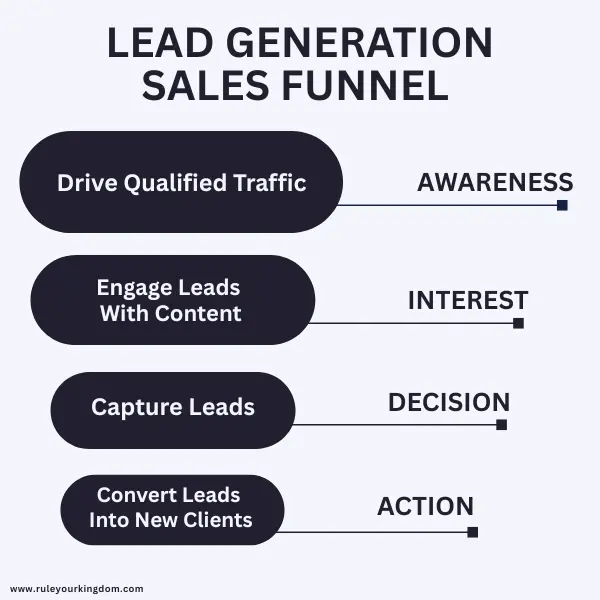
Finally, there’s the Action stage, which is often overlooked but critical to success. This is where you need to have a solid method for attracting clients, intake procedures, and a system in place to capture leads who reach out.
The key to success lies in optimizing every stage of the funnel, recognizing that a weakness in any area can undermine the entire lead generation process. Many attorneys focus on generating new attorney leads, but neglect the crucial conversion steps that turn those leads into clients.
Proven Lead Generation Strategies for Law Firms in 2025
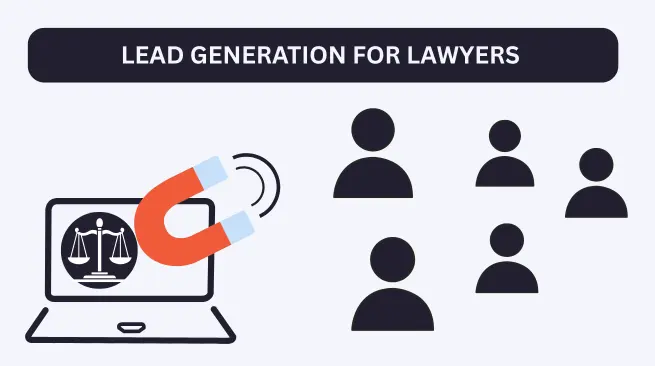
Word of Mouth & Referrals: The Foundation of Sustainable Growth
Let’s face it – despite all the advancements in digital marketing, referrals still reign supreme as the most popular way to drive more leads for most law firms. And there’s a reason for this: personal recommendations carry a lot of weight, especially in the legal industry where trust is everything and the stakes are high.
So, how do you cultivate a steady stream of referrals? It starts with intentional networking within your local community. Attend chamber of commerce events, join professional associations, and form strategic partnerships with complementary businesses. And don’t forget to show your appreciation for past legal clients who send new business your way – a formal referral incentive can go a long way in acknowledging their role in your law firm’s growth.
The benefits of referral-based lead generation are clear. These prospects come pre-qualified and already trust your legal knowledge. But relying solely on referrals can limit your growth potential and leave your law firm’s reputation vulnerable to fluctuations in your network’s activity.
Organic SEO: Building Long-Term Authority
Search engine optimization is a crucial foundation for building a sustainable digital lead generation strategy for your law practice.
The fact is that 87% of potential clients start their search for legal answers with a Google search. If your law firm lacks a good SEO strategy, you risk not generating quality leads to your law firm.
To get started with effective law firm SEO, it’s essential to conduct thorough keyword research that targets not only high-volume terms but also specific long-tail phrases relevant to your legal practice areas.
By creating authoritative and high-quality content that addresses common client questions, you can establish your expertise and improve your visibility for organic search results.
The beauty of organic SEO is its long-term potential for growth. Unlike paid advertising, which stops delivering results as soon as you stop paying for it, organic rankings continue to generate leads month after month.
What’s the catch? Meaningful results typically take 6-12 months of consistent SEO and digital marketing techniques, requiring patience and persistence to see significant returns.
Local SEO: Dominating Your Geographic Market
If you’re a law firm that specializes in serving a specific geographic area, local SEO is a marketing investment that’s hard to beat. Think about it: when someone types in “personal injury lawyer near me” on search engines, they’re looking for help right now.
By appearing in the “map pack” for those searches, your firm will be directly in front of motivated prospects who are ready to take action.
So, how do you get there? It starts with optimizing your Google Business Profile with accurate information, regular updates, and a steady stream of authentic client reviews. This is the foundation of local search success, and it’s essential for getting your firm noticed by the right people.
From there, you can build on that foundation by incorporating location-specific keywords throughout your website and creating content that’s focused on your neighborhood. This could be anything from blog posts about local laws and regulations to videos that showcase your expertise in a specific area.
The benefits of local SEO are clear: you get more leads with strong geographic relevance, often at a lower cost than other digital channels. And for small to mid-sized firms that are focused on a specific market area, the competitive advantage gained through strong local search engine rankings is priceless. It’s a valuable asset that can help you stand out from the competition and attract the clients you need to grow your law practice.
Pay-Per-Click (PPC) Advertising: Immediate Visibility for Competitive Keywords
While organic digital marketing methods can take time to build momentum, PPC ads can give you instant visibility online. With Google PPC Ads, you can appear at the top of search engine results for your target keywords, putting you in front of more leads right away.
However, we need to be realistic about the costs involved. The legal industry is one of the most expensive when it comes to paid search ads, with competitive terms like “personal injury lawyer” costing anywhere from $50 to $250 per click in major markets. That’s a significant investment, but it can be worth it if you’re targeting specific case types and optimizing your ads campaign for maximum return.
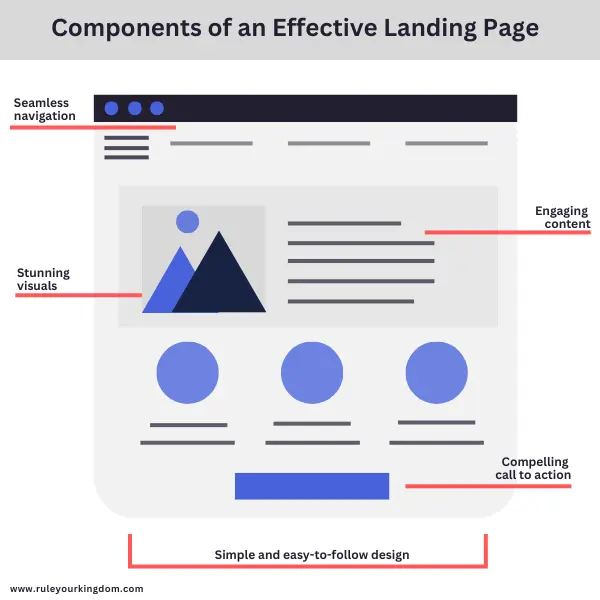
The key to successful PPC ads management is developing a targeted strategy that drives real results. This means creating landing pages, local service ads, and social media posts specifically designed to convert visitors from paid traffic sources into new leads.
These landing pages should be clear, compelling, and easy to use. They should have a clear call to action, evidence of your expertise, and a streamlined contact form to maximize lead capture. With the right approach, PPC ads and landing pages can be a powerful attorney lead generation strategy for your law practice.
Local Service Ads: The Evolution of Legal AdvertisingAnother effective attorney lead generation strategy is implementing
Google’s Local Service Ads (LSAs). These ads have been a game-changer for law firms, offering a pay-per-lead model that’s both impactful and efficient.
Here’s how it works: Local service ads create a “Google Guaranteed” listing that appears above traditional ads and organic results, featuring your firm’s rating, years in business, and a direct contact option. This lead generation for lawyers gives you instant credibility and makes it easy for potential clients and quality leads to get in touch.
The best part? You only pay when a potential client actually contacts your firm, not for impressions or clicks. This means you can avoid wasting ad spend and get a much better return on investment compared to traditional PPC ads.
However, it’s worth noting that LSAs require Google’s verification process, which can be a bit of a hurdle. Unfortunately, they’re not available for all practice areas in all markets. Plus, competition for these placements has increased dramatically since their introduction, making them more challenging to leverage in saturated markets. A reputable PPC ad agency can help you learn more about this strategy and how it can amplify your attorney lead generation efforts.
Social Media Marketing: Building Community and Trust
Social media is a great way for law firms to show off their expertise, share success stories, and put a face to their practice.
The key to impactful social media marketing is focusing on providing value, not just promoting your legal services. A good rule of thumb is to split your social media posts 70/30 – 70% should be informative, answering common questions, or explaining legal details, and 30% can be more promotional.
Video content is a winner on social media platforms, especially short, educational clips that engage people and start conversations. Depending on your practice area, platforms like LinkedIn might be your best bet for B2B connections, while posting on Facebook and Instagram can be a great marketing strategy for finding new clients.
Traditional Marketing: Strategic Support for Digital Efforts
Traditional advertising channels – including television, radio, billboards, and print – continue to play a role in comprehensive lead generation for lawyers. These methods build broad awareness and perceived legitimacy, particularly in smaller markets where traditional media still commands significant attention.
The limitations of traditional marketing include its high cost relative to reach and the difficulty in measuring exact return on investment. Unlike digital channels that provide precise attribution data, traditional media’s impact often remains difficult to quantify with certainty.
For most law firms, traditional advertising works best when supporting digital strategies rather than standing alone. Billboards and TV spots that direct viewers to optimized landing pages create measurable pathways to conversion while building cumulative brand awareness.
Buying Leads: Supplementary but Risky
Buying leads from lead generation companies might seem like an easy way to get new clients, but it’s not always straightforward. These companies generate leads and sell them to law firms, but the quality of legal leads can vary a lot.
Some provide high-quality, exclusive leads, while others might just give you contact info for people who aren’t really interested.
Before buying leads, it’s essential to know how they’re generated, the company’s reputation, and what kind of cases they’re providing. Most successful law firms use bought leads as a supplement to their own marketing strategy, not the primary method. The best approach is to build your own lead generation assets and use bought leads to fill gaps or explore new areas.
Are Lead Generation Companies Worth It for Law Firms?
The question of whether to partner with attorney lead generation experts deserves careful consideration. These companies promise to deliver a steady stream of legal clients without requiring your direct involvement in marketing activities.
The reality is more nuanced than most sales pitches suggest. Lead generation companies can provide value, particularly for larger firms with robust intake processes and the capacity to quickly follow up with new prospects. Their expertise in digital marketing may deliver faster results than building capabilities in-house.
However, many law firms report disappointing experiences with some lead generation services, citing issues with lead quality, exclusivity, and cost-effectiveness. The best partnerships occur when firms maintain realistic expectations, closely monitor performance metrics, and hold their providers accountable to clearly defined standards.
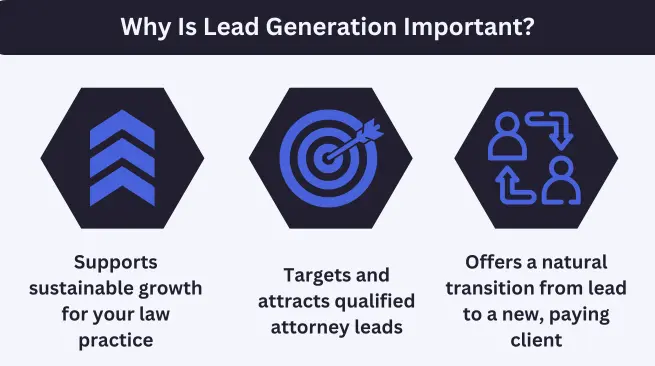
For most law firms, the optimal approach combines the selective use of reputable attorney lead generation services with ongoing investment in owned marketing assets. This balanced strategy provides immediate flow while building sustainable, independent lead sources for long-term growth.
Optimizing Your Law Firm’s Client Intake Process
Even the most sophisticated lead generation strategy can lead to a broken sales funnel. This happens when lead generation for lawyers doesn’t have proper intake processes to convert prospects into paying clients. Your intake system serves as the critical bridge between marketing efforts and revenue generation.
The first contact experience sets the tone for the entire client relationship. Ensure that calls are answered promptly by trained staff who can empathetically address concerns while efficiently gathering necessary information. Many law firms lose qualified leads simply because they lack responsive intake systems.
Technology plays an essential role in modern intake optimization. Customer relationship management (CRM) systems designed for law offices can automate follow-up sequences, track prospect interactions, and ensure no potential client falls through the cracks. These systems provide accountability and measurable data to continuously improve your conversion rates.
Regular training for intake staff should emphasize both technical competence and emotional intelligence. The best intake specialists combine procedural knowledge with the ability to connect with distressed clients who may be facing the most challenging situations of their lives.
Building a Balanced Lead Generation Strategy for Your Law Firm
The most successful law firms implement multi-channel marketing strategies rather than relying on a single lead source. From paid ads and organic search engine optimization to social media marketing and managing online reviews, this diversified approach provides protection against algorithm changes, market shifts, and competitive pressures.
Begin by evaluating your current client acquisition methods, identifying strengths to leverage and weaknesses to address. Most firms benefit from combining quick-win tactics (like paid ads) with long-term investments (like content marketing and SEO) to balance immediate needs with sustainable growth.
Your practice area and target audience should heavily influence your channel selection. High-value practice areas like personal injury often justify significant investment in competitive channels, while specialized niches might benefit more from targeted content strategies addressing specific legal questions.
Budget allocation requires strategic thinking about both short and long-term objectives. We typically recommend that growing firms allocate 60-70% of their marketing budget to proven channels with established ROI, while dedicating 20-30% to testing new opportunities and 10% to experimental approaches that might yield breakthrough results.
Leveraging Your Law Firm’s Website as a Lead Generation Engine
Your law office’s website serves as the central hub of your digital lead generation efforts. In today’s competitive market, a basic law firm online presence is no longer sufficient—your site must function as a sophisticated lead capture and conversion tool.
Effective legal websites balance compelling visual design with strategic conversion elements. Each practice area should have dedicated landing pages optimized for relevant keywords and designed to address specific client concerns. These pages should include clear calls to action, trust indicators, and streamlined contact options.

Content marketing through regular blog posts addressing common legal questions serves multiple purposes in your lead generation strategy. These resources improve your search engine position, demonstrate expertise to potential clients, and provide valuable material for social media channels and email marketing campaigns.
The technical performance of your website directly impacts both user experience and search rankings. Regular audits should evaluate page speed, mobile responsiveness, security protocols, and overall user journey to identify improvement opportunities that can increase conversion rates.
Email Marketing: Nurturing Relationships with Prospects and Past Clients
Email remains one of the most cost-effective channels for nurturing relationships with both prospects and previous clients. Strategic email marketing campaigns allow your firm to stay top-of-mind without the ongoing costs associated with paid advertising.
For prospects who aren’t ready to hire an attorney immediately, educational email sequences can provide valuable information while building trust in your expertise. These nurture campaigns should address common questions, explain legal processes, and offer genuine value rather than simply promoting your services.
Past client communication represents an often-overlooked opportunity for generating warm leads through referrals. Regular updates about legal developments, firm news, and community involvement maintain relationships that can lead to both repeat business and valuable recommendations.
The Importance of Analytics in Lead Generation
Effective lead generation requires continuous measurement and optimization based on actual performance data. Establishing key performance indicators (KPIs) for each marketing channel provides objective benchmarks for evaluating success.
Essential metrics to track include cost per lead, lead-to-client conversion rate, acquisition cost of new clients, and lifetime client value across different practice areas. These data points reveal which channels deliver the strongest return on investment and deserve increased resources.
Regular analysis should identify both underperforming areas for improvement and successful strategies for expansion. Most law offices benefit from monthly performance reviews that guide tactical adjustments and quarterly strategic assessments that inform larger resource allocation decisions.
Advanced analytics implementation can track the entire client journey from initial awareness through case resolution, providing invaluable insights into which marketing messages and channels attract your most valuable clients. This closed-loop reporting transforms marketing from a cost center to a scientific revenue generator with predictable returns.
Converting More Leads Through Trust Signals
In the competitive legal marketplace, establishing credibility quickly is essential for converting prospects into clients. Strategic trust signals throughout your marketing materials significantly increase conversion rates across all channels.
Client testimonials represent one of the most powerful trust-building tools available to law firms. Authentic reviews discussing specific aspects of the client experience prove more persuasive than general claims about your expertise or service quality.
Case results, when ethically presented with appropriate disclaimers, provide concrete evidence of your ability to deliver outcomes. These results should highlight both financial recoveries and less tangible benefits like peace of mind, resolution, or justice achieved for clients.
Professional credentials, awards, and association memberships further strengthen your perceived authority. While these signals may seem formal, they provide reassurance to prospects evaluating multiple firms with similar service offerings.
Mobile Optimization: Essential for Today’s Legal Consumer
With over 65% of legal searches now occurring on mobile devices, mobile optimization has moved from optional to essential for effective lead generation. Your entire digital presence must deliver exceptional experiences on smartphones and tablets.
Mobile responsive design ensures your website automatically adjusts to different screen sizes without sacrificing functionality or visual appeal. Navigation should be intuitive, with important contact options prominently displayed for easy access.
Page speed takes on even greater importance in mobile environments, where users have less patience for loading delays. Each second of load time increases bounce rates significantly, directly impacting your conversion opportunities and search rankings.
Click-to-call functionality provides a critical advantage on mobile devices, allowing prospects to contact your firm with a single tap. This seamless connection process dramatically increases contact rates compared to forms that require manual information entry on small screens.
Targeted Online Advertising Beyond Search
While search ads capture active prospects, targeted display and social media ads allow you to reach potential clients before they begin actively searching for an attorney. These awareness-building campaigns can significantly expand your reach while supporting other lead generation for lawyers efforts.
Retargeting ads that follow website visitors across the internet provide multiple opportunities to convert prospects who weren’t ready to contact you initially. These campaigns typically deliver strong ROI by focusing exclusively on people who have already demonstrated interest in your services.
Social media ads on platforms like Facebook and Instagram offer sophisticated targeting capabilities based on demographics, interests, behaviors, and life events. For practice areas like family law or estate planning, these targeting options can reach prospects facing relevant life transitions.
Conclusion: Building a Sustainable Lead Generation System
Effective lead generation for lawyers requires a systematic approach that aligns with your firm’s specific goals, resources, and competitive landscape. The most successful strategies combine immediate lead flow with long-term asset building.
Begin by optimizing your foundation – your website, intake processes, and core messaging. These elements support all other marketing efforts and directly impact conversion rates across channels.
Implement a balanced channel strategy that includes both quick-win tactics and sustainable approaches. This diversification protects your firm from becoming overly dependent on any single lead source while maximizing overall performance.
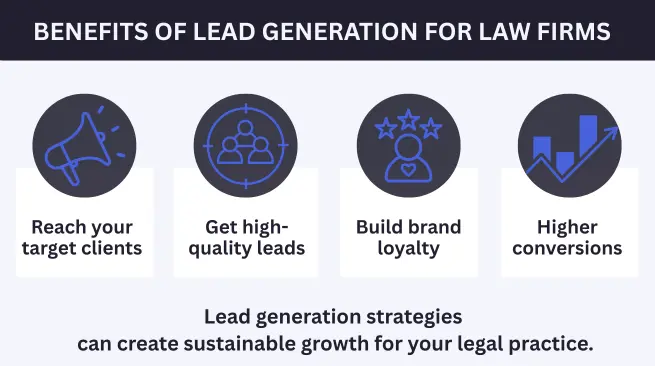
Most importantly, commit to continuous improvement through regular analysis and refinement. The legal market evolves constantly, and yesterday’s effective strategies may underperform tomorrow without ongoing optimization.
Our team specializes in helping law firms develop and implement comprehensive lead generation systems that deliver predictable growth. If you’d like to discuss how these strategies might apply to your specific practice, contact us for a complimentary consultation and competitive analysis.




